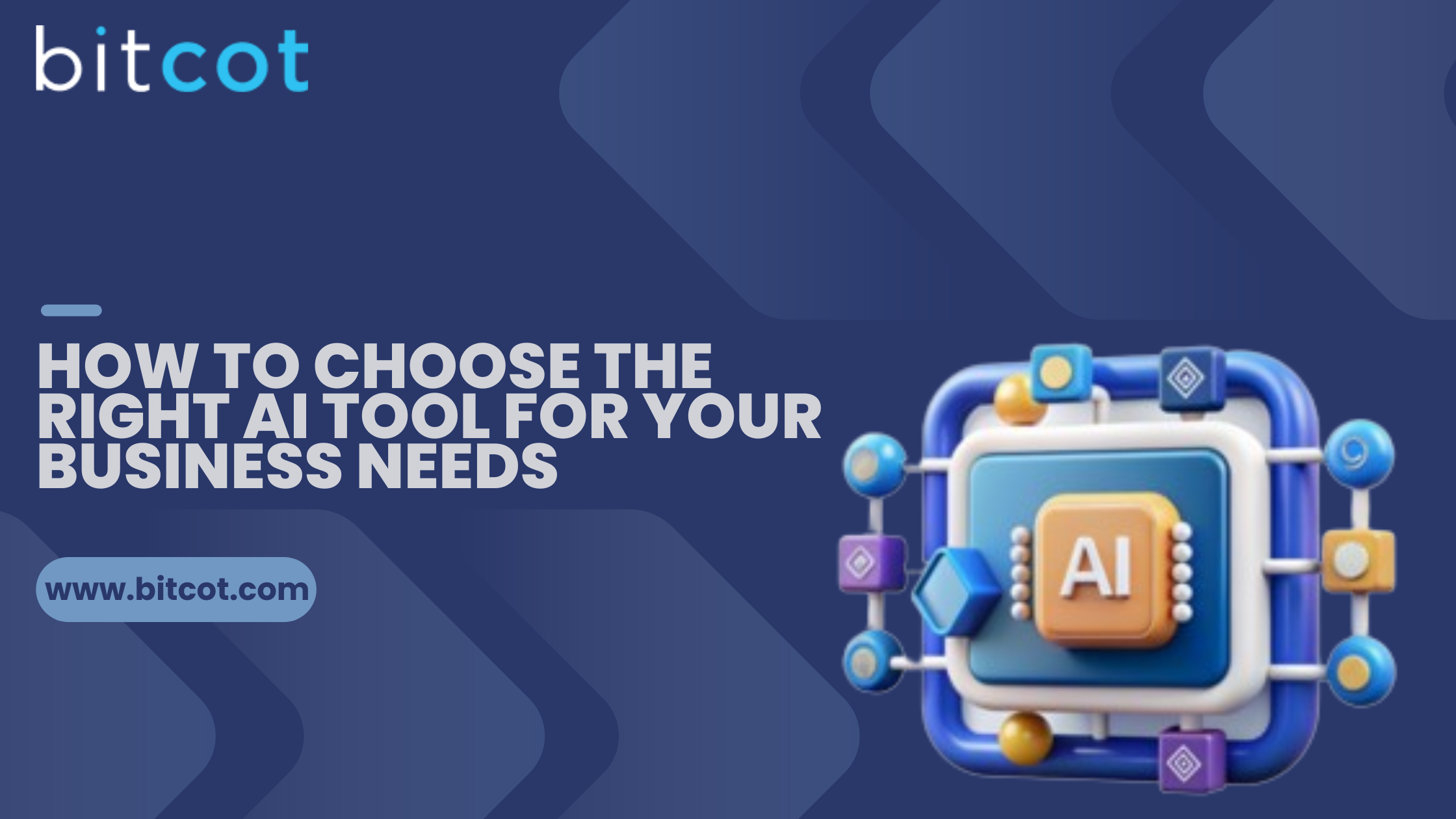How to Choose the Right AI Tool for Your Business Needs
 Raj Sanghvi
Raj Sanghvi
Artificial Intelligence (AI) is revolutionizing the way businesses operate. From automating repetitive tasks to making smarter data-driven decisions, AI tools are no longer a luxury—they are becoming essential for businesses of all sizes. However, with so many AI tools available, it can be overwhelming to choose the right one for your business. Here's a guide to help you navigate this decision-making process.
1. Understand Your Business Needs
Before jumping into the world of AI tools, take a step back and assess your business needs. AI tools are designed to streamline specific processes, whether it's customer service, data analytics, marketing, or operations. Ask yourself these questions:
What problems am I trying to solve?
For example, if your customer service team is overwhelmed with queries, a chatbot might be the best solution. Alternatively, if you're looking to automate repetitive tasks, Robotic Process Automation (RPA) might be ideal.
Which department will benefit the most?
Certain AI tools are built for specific functions like sales, marketing, HR, or customer support. Identifying the department or function that will benefit the most from automation is key.
2. Identify the Type of AI Tool You Need
There are various types of AI tools, each designed to address different needs. Here's a breakdown of some popular categories:
Customer Service AI Tools (Chatbots and Virtual Assistants):
Tools like Zendesk and Intercom automate customer support interactions and can handle a high volume of queries, offering instant responses to customers while reducing the need for human agents.
Data Analytics and Predictive Tools:
AI tools like Tableau or Google Analytics use AI to analyze data patterns and help businesses make informed decisions. These tools are essential for companies looking to gain insights from large datasets and predict future trends.
Robotic Process Automation (RPA):
If you’re aiming to automate repetitive and time-consuming tasks, tools like UiPath and Automation Anywhere offer RPA solutions. These platforms can handle everything from data entry to complex processes like invoice processing.
Marketing AI Tools:
Platforms like HubSpot and Marketo use AI to optimize marketing campaigns, personalize content for individual customers, and automate email marketing efforts.
3. Scalability and Integration
One of the most important factors to consider when choosing an AI tool is scalability. As your business grows, so will your needs. Ensure that the AI tool you choose can scale with your business and handle increased data or interactions over time.
Also, look for tools that easily integrate with your existing software systems. AI tools that can seamlessly connect with your CRM, email marketing platform, or accounting software will save you time and resources in the long run.
4. Ease of Use and Implementation
Some AI tools require significant technical knowledge to operate, while others are user-friendly and don’t require an IT team to manage them. Consider your team’s expertise and the amount of time you can allocate to training and implementation.
If your team isn’t tech-savvy, look for intuitive platforms that come with comprehensive customer support, tutorials, and an easy-to-use interface.
5. Budget Considerations
While some AI tools offer free versions with basic features, others can get quite expensive. When considering your budget, take into account not just the upfront cost, but also the potential return on investment (ROI). Will the AI tool save you enough time or increase revenue to justify the investment?
Additionally, many AI tools have tiered pricing based on the number of users or features, so choose the plan that fits your business size and needs.
6. Try Before You Buy
Many AI tools offer free trials or demo versions. Take advantage of these offers to test the tool’s features, ease of use, and performance before committing. During the trial period, assess how well the tool integrates into your business processes and whether it delivers the results you need.
7. Evaluate Customer Reviews and Testimonials
Before finalizing your decision, look at customer reviews and testimonials to gauge the experiences of other businesses in your industry. What challenges did they face? How did the AI tool help them overcome these challenges?
Platforms like G2 Crowd and Capterra offer unbiased reviews from real users, which can give you an idea of the tool’s reliability and customer support.
Conclusion Choosing the right AI tool for your business involves evaluating your specific needs, the type of automation you want, scalability, ease of use, and of course, the budget. Finding the best AI tools is crucial to enhancing your business operations. The right AI solution can improve efficiency, enable data-driven decisions, and boost overall performance. Take the time to carefully assess your options, test the tools, and select the one that best aligns with your business goals.
Subscribe to my newsletter
Read articles from Raj Sanghvi directly inside your inbox. Subscribe to the newsletter, and don't miss out.
Written by

Raj Sanghvi
Raj Sanghvi
Raj Sanghvi is a technologist and founder of BitCot, a full-service award-winning software development company. With over 15 years of innovative coding experience creating complex technology solutions for businesses like IBM, Sony, Nissan, Micron, Dicks Sporting Goods, HDSupply, Bombardier and more, Sanghvi helps build for both major brands and entrepreneurs to launch their own technologies platforms.